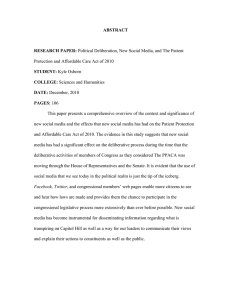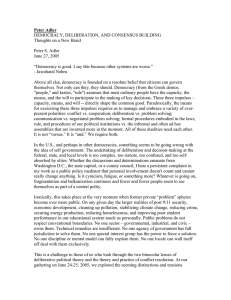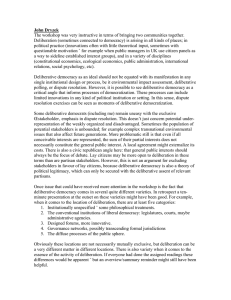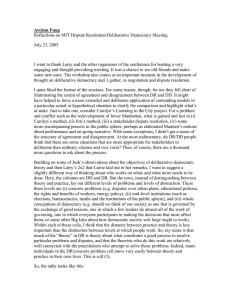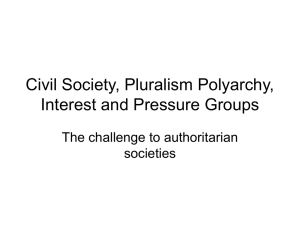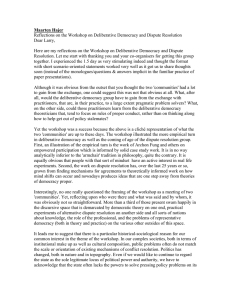Document 13653338
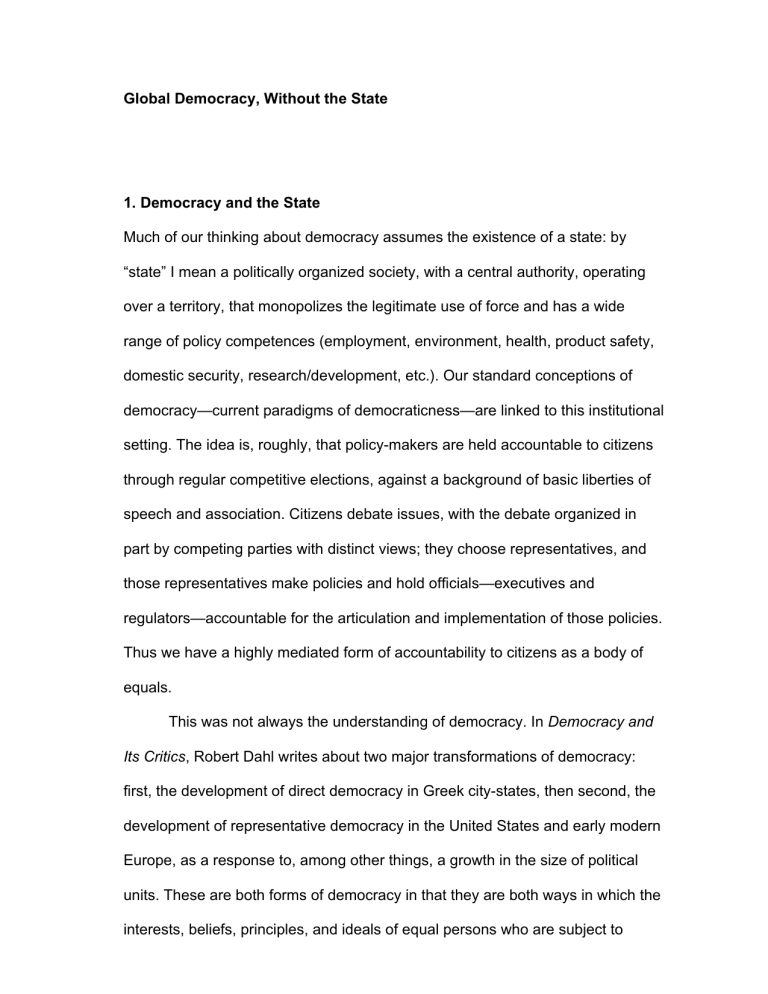
Global Democracy, Without the State
1. Democracy and the State
Much of our thinking about democracy assumes the existence of a state: by
“state” I mean a politically organized society, with a central authority, operating over a territory, that monopolizes the legitimate use of force and has a wide range of policy competences (employment, environment, health, product safety, domestic security, research/development, etc.). Our standard conceptions of democracy—current paradigms of democraticness—are linked to this institutional setting. The idea is, roughly, that policy-makers are held accountable to citizens through regular competitive elections, against a background of basic liberties of speech and association. Citizens debate issues, with the debate organized in part by competing parties with distinct views; they choose representatives, and those representatives make policies and hold officials—executives and regulators—accountable for the articulation and implementation of those policies.
Thus we have a highly mediated form of accountability to citizens as a body of equals.
This was not always the understanding of democracy. In Democracy and
Its Critics , Robert Dahl writes about two major transformations of democracy: first, the development of direct democracy in Greek city-states, then second, the development of representative democracy in the United States and early modern
Europe, as a response to, among other things, a growth in the size of political units. These are both forms of democracy in that they are both ways in which the interests, beliefs, principles, and ideals of equal persons who are subject to
Global Justice, 2 collective decisions are brought to bear on making those decisions: ways that the authorization to exercise power results from the collective decisions of the equal persons who are governed by that power. The modern conception—with representation and party competition—emerges in response to demands of responsiveness and accountability in the setting of a modern state, with the indicia of Westphalian sovereignty. It took considerable invention, both intellectually and practically, to see how the abstract idea of democracy could be brought to bear on a modern, centralized, large, sovereign state.
There are of course serious questions about the democratic credentials of laws and policies chosen by elected officials, or by agents (administrative agencies) acting under their supervision: not least because laws and policies are so loosely linked to informal public discussion and processes of opinion formation, so the idea that they issue from processes of collective decisionmaking that treat people as equals is a matter of disagreement: the agency relations extending from people to policy-makers are pretty weak.
But I don’t wish to pursue those questions here. I want instead to focus on the thought—suggested by current discussion of the prospects for a more global democracy—that we may be witnessing the emergence of a new challenge to democracy that will require a comparable reconceptualization of what democracy arrangements consist in. The question is: how should we think about democracy and democratizing decision-making when the decision maker is not a state, or any other form of central authority, with the characteristics of a Westphalian sovereign—both because of some disaggregation within states, so that agencies themselves operate in policy coordination as parts of global networks (see
Global Justice, 3
Slaughter), and because of large involvements of non-state actors in an emerging global public sphere (see Ruggie)?
2. Two Cases
Two political phenomena—both of which throw the boundaries of the state as a distinct arena into question —prompt the question.
Consider first the European Union, and the associated debate about the so-called “democracy deficit” in the EU. Two broad descriptions of the EU have dominated the discussion, and guided arguments about its institutional evolution.
According to the first (suggested in the readings from Dahl and Kymlicka), the EU is best understood as an intergovernmental organization, with member states, where the legitimacy of its decisions—insofar as the legitimacy is democratic, not technocratic—is inherited from the democracy legitimacy of its members (the natural decision rule is unanimity). According to the second, the EU is an emerging independent polity that will eventually look like a federal republic of
Europe, with a Euro-civil society and public sphere of associations and parties, political institutions with the competences of a state (the European parliament and associated regulatory bodies), solidarities constructed through the formation of the EU, and a democratic government that will win legitimacy through popular authorization.
I think it is fair to say now that something else is happening: that the EU is emerging as a more complex combination of forms, some more intergovernmental, some more independent state-like, and some—particularly in the regulatory, rule-making framework that surrounds the single European market—that do not easily fit the intergovernmental or independent polity models.
Global Justice, 4
They do not fit because the parts act neither as independently as separate states nor as parts of a single state. The regulatory processes involve, in particular, a decentralized specification of policy standards (say, in employment policy), disciplined by a systematic comparison with standards in other locations, with the aim of mutual correction and improvement rather than convergence on a single standard or policy. So while there are reasonable demands for the democratization of the EU, it is not clear how to use our ideas of democracy to assess the complicated mix.
2. The second phenomenon is globalization—roughly, the emergence of a single world market and a single set of prices for goods and services, capital and labor. Globalization means more of the population becomes more vulnerable to economic forces outside their own country. It means—or at least, it has meant—a widening of inequalities. At the same time, globalization apparently reduces government’s capacity to shield citizens against markets: or at least it has been associated with less shielding.
Once more, globalization draws two stylized responses from democrats: one suggests that there should be an international state with the capacity to address the emerging economic and environmental interdependencies, and to control the otherwise-untamed operations of multinationals and other organized interests that operate across borders. Held’s account of cosmopolitan democracy suggests this line of response: though he does say that a cosmopolitan democracy is a state, he does describe a scheme of cosmopolitan law.
A second response is that we need both a reassertion of democratic authority at the national level—greater willingness to develop new methods of asserting control within borders—combined once more with an improved form of
Global Justice, 5 intergovernmentalism at the level of global institutions. This line of thought is suggested in Kymlicka and Dahl, and by Stiglitz in his discussion of reforms of voting rights and improved transparency for the major international economics institutions (Bank, IMF, and WTO). Stiglitz emphasizes the role of governance reforms in ensuring policy that is more attentive to the needs of beneficiaries—who are currently unrepresented in discussion—he also thinks of the institutions as public, and of the governance reforms—both accountability and transparency—as suited to their public status.
But world state and perfected intergovernmentalism do not exhaust the possibilities for thinking about current political developments and prospects for democracy. As Ruggie emphasizes in his account of the issues of global governance and the emerging global public domain, there is now something that we can call a global public sphere with a politics focused on issues labor standards, environmental policy, health policy, trade, human rights, economic development—and with emerging institutions, norms, movements, and
(contested) forms of discourse, in which the agents are not at all confined to states or officials. Even more than in the case of the EU, we see an emerging politics, that is functionally differentiated (different institutions and organizations for different problems) and that lacks a regulatory center. And, once more, while there is discussion about democratizing global governance, it is not clear what that democratization might look like.
In both cases, we see is the emergence of new arrangements of collective problem-solving. In each case, the problems they address are urgent, and in each case the new arrangements emerge because existing institutions seem inadequate to handling them. Moreover, the tasks of these new arrangements
Global Justice, 6 are clearly political . What I mean by that is that the problems are not understood to be susceptible to technical solution (in part because there are real disagreements about goals), and they are difficult to legally codify in ways that could be implemented by courts. Democracy names a class of arrangements through which the interests, beliefs, principles, and ideals of persons who are subject to collective decisions are brought to bear on making those decisions: ways that the authorization to exercise power results from the collective decisions of the members of a society who are governed by that power. What might it be for these arrangements—which lack a a rule-making and rule-applying center—to be made more democratic?
3. Deliberative Polyarchy
That question is too broad, but there is slightly less broad version of the question that emerges from examination of some of these new areas of problem-solving.
In these areas, the emergent ways of addressing problems fall into an interesting pattern that embodies a certain kind of deliberation . Generically speaking, deliberation is a matter of addressing issues by weighing relevant reasons.
Deliberative decision-making is different from decision-making that aggregates preferences, and also from technocratic decision-making, in which goals are assumed to be fixed and known in advance. Deliberation is a matter bringing our powers of reasoning to bear on solving problems when there are assumed to be plurality of relevant considerations that any acceptable solution needs to consider, and diverse opinions about how best to balance those considerations.
In the cases I have in mind, deliberation takes a particular form: what we find is that similar problems (health, environmental protection, employment,
Global Justice, 7 education, adequate compensation for workers, etc.) emerge in different locations, which are not only geographically distinct but culturally, economically, and politically distinct. While the differences in location suggest a need for differences in solution, the commonality of problems indicates a need to test and discipline local solutions against those adopted elsewhere: the aim is not to achieve uniformity, but to pool information, identify best practices, and compare solutions across locations. Consider the cases of labor standards, where it seems clear that different standards for wages and working conditions are suited to different levels of development, and that uniformity represents a mix of regulatory imperialism and protectionism.
So what seems desirable are arrangements that are friendly to local experimentation in the policy area in question, that pool the results of those experiments in ways that permits outsiders to monitor and learn from those efforts, that identify best (or anyway, better) practices, and that require comparisons of solutions across sites. And this suggests a very abstract architecture of what I will call “deliberative polyarchy”—“deliberative” because decision-making involves reasoning about solutions to problems, “polyarchy” because the architecture is essentially multi-centered.
Consider first the individual decision-making units. Diversity implies that decision-making in each needs to draw on local knowledge and values. As each unit is distinct, none does best by simply copying solutions adopted by others, though they may do well to treat those solutions as baselines from which to move. Local problem solving is well-suited to bringing the relevant local knowledge and values to bear in making decisions. Deliberative participation
Global Justice, 8 helps because it encourages the expression of differences in outlook, and the provision of information more generally.
But the same concern for a form of decision-making that it is attentive to unexplored possibilities and unintended consequences requires institutionalization of links among local units—in particular, the institutionalization of links that require separate deliberative units to consider their own proposals against benchmarks provided by other units. A natural place to look for promising alternatives—including alternatives previously unimagined in the local setting—is in the experience of units facing analogous problems. So we need deliberative coordination: deliberation among units of decision-making directed both to learning jointly from their several experiences, and improving the institutional possibilities for such learning—a system with continuous discussion across separate units about current best practice and better ways of ascertaining it.
This abstractly-described architecture is pervasive in the EU (see the
Cohen-Sabel paper). Local, or, more exactly, lower level actors—govenments or national peak organizations of various kinds within the EU; regions, provinces or sub-national associations within these, and so on down to whatever neighborhood is relevant to the problem at hand—are given autonomy to experiment with their own solutions to broadly defined problems of public policy.
In return they furnish central or higher-level units with rich information regarding their goals as well as the progress they are making towards achieving them.
They agree as well to respect the framework rights of democratic procedure and substance as these are elaborated in the course of experimentation itself. The periodic pooling of results reveals the defects of parochial solutions, and allows the elaboration of standards for comparing local achievements, exposing poor
Global Justice, 9 performers to criticism from within and without, and making of good ones
(temporary) models for emulation.
So we have the abstract architecture of deliberative polyarchy, which has four characteristics: (1) it combines diversity of solutions for different locations with a requirement of disciplined comparisons across units; (2) the form of decision making is deliberative problem solving; (3) the coordinating decisionmaking is often functionally specific (setting labor standards, establishing product safety requirements, environmental protection, public safety, etc.); and (4) the arrangements have “variable geometry”—that is, membership varies across different problems.
4. Democracy and Deliberative Polyarchy?
Suppose we can agree that there are a variety of emerging forms of deliberative polyarchy. What would it mean for these to become more democratic?
The question arises in part because deliberation is not itself intrinsically democratic: it can be conducted in closed, private bodies, that make fateful choices, without being connected to open public debate and practice. So while deliberative polyarchy itself may have attractions as a method of problemsolving, it is bound to face legitimacy problems that cannot be addressed simply by noting the essential design features that I have described. But how might the democratic idea be brought to bear on arrangements of deliberative polyarchy? I want to make three observations about the question, each of which will require us to bear in mind that while deliberative polyarchy is not necessarily democratic, the path to its democratization builds off its deliberativeness.
Global Justice, 10
First, then, we can promote the democraticness of deliberative polyarchy by insisting on the requirement of disciplined comparisons across different efforts at problem-solving. Those comparisons bring the different experiences in those diverse places to bear on problem-solving in each location. Deliberative polyarchy is, in short, a way to systematically pool a wide range of ideas and experiences: it thus creates, in effect, a kind of dispersed public political-policy discussion across different locations, and it disciplines solutions in each location by reference to that broader discussion—so influence extends across locations not through a uniform solution established by a regulatory center, but by establishing standards that others need to consider.
Second, assume that arrangements of deliberative polyarchy form in distinct areas of concern. In the case of labor standards, for example, imagine a coordinated system of monitoring that would certify monitors to conduct audits of firms (also subject to independent audit), and also require that monitors report back their findings to the “super-monitor” constituted by international organizations such as the World Bank and International Labor Organization, together with international NGOs and international trade union confederations.
This umpire organization would monitor the monitors, conduct inspections to verify their integrity, assure the comparability of monitoring data and methods, and make results publicly accessible. Firms that depend on consumer loyalty would be eager earn high grades. They would pressure less visible suppliers, and suppliers of suppliers, to follow suit. Activists, consumer groups, analysts, and journalists would use information to define acceptable behavior, press for improvements, and push the monitors to improve their methods and their standards. And the same will be true in other areas as well. Assuming a norm of
Global Justice, 11 transparency, as well as protections of rights to associate and speak—all very substantial assumptions, of course—deliberative polyarchies, once constructed, will become the focus of debate and pressure from organizations that already exist to influence policy in these areas, as well as new organizations that see new opportunities for influence. That is, as arrangements of deliberative polyarchy crystallize, they will become the focus of political activity.
There is of course a very large question—analogous to questions about conventional democracies, with substantial inequalities of resources—about the extent to which opportunities for influence will be equal, even if we assume transparency, and protections of expressive and associative liberties. Thinking of ways of foster such equality when deliberative polyarchy does not operate in the shadow of a state is a large task for democratic theory. But ensuring transparency, as well as the expressive and associative liberties, would certainly be a large first step.
Third, a standard element of local problem-solving in emerging systems of deliberative polyarchy is participation by non-state organizations that bring some competence to the discussion of specific problems. Ruggie mentions five roles of such organizations: they implement policy (providing basic goods such as health and education, under contract with governments or international organizations), though it should be said that the distinction between a role in implementing policy and a role in designing it is hard to sustain; they play a role in generating, deepening, and implementing transnational norms; they help both to advance and to block international agreements; they coordinate with international actors to promote domestic change (boomerang effect); and they encourage transparency.
But participation by groups with special competences naturally prompts concerns
Global Justice, 12 about the representativeness of those organizations, and therefore about the democraticness of the decisions they reach. How can the outcomes plausibly be represented as the result of a process in which people participate as equals?
Once more, I do not have an answer to the question, but an observation that bears on it. In particular, the concern may be fueled by a conception of participating organizations as representing the interests of a group. But a deliberative polyarchy may change the way that groups organize and understand their role in local problem-solving bodies that are parts of a deliberative network.
Because problem-solving is deliberative, groups organize not simply to defend the interests of members, but because of distinctive views about how best to solve problems, views that themselves emerge from local discussion. Assuming, once more conditions of transparency and openness to pressures under conditions of expressive and associative liberties, democraticness may be fostered by ensuring that deliberation takes appropriate considerations into account.
5. Some Skeptical Concerns
There is much more to be said about how to make deliberative polyarchy more democratic. But I want to finish by noting some lines of skeptical argument about the idea of democratizing deliberative polyarchy: skepticism expressed in different ways by Dahl and Kymlicka (see essays in Shapiro and Hacker-
Cordon).
Dahl’s skepticism is puzzling because the precise focus of his concerns seems to shift over the course of his argument. Thus he begins with concerns about the interests that citizens take specifically in foreign policy questions as
Global Justice, 13 distinct from other sorts of policy issues. But it is difficult to see a fundamental distinction here between foreign policy and large areas of domestic policy. In any case, Dahl’s own concern appears to shift from policy substance to the decline in citizen influence that comes with an increase in the size of political units: the influence of Swedes over their own parliament is greater than their influence over the European parliament. But suggests a case for having no large political units at all, which is also not Dahl’s point. And the fact that this is not the concern emerges in the following comment: “To achieve a level of popular control that is anywhere near the level already existing within democratic countries, international organizations would have to solve several problems about as well as they are now dealt with in democratic countries” (30-31). He mentions five conditions which amount, in effect, to the view that they would need to look like conventional democracies: with, among other things, party competition and legislative control of agencies. The skepticism, then, seems not to be at all directed against the possibility of a eurodemocracy or a global democracy, but against democratizing intergovernmental organizations, and that seems to be well-taken.
But then he adds a concern that we met with in the discussion of Miller and is suggested by Kymlicka as well: namely, that the successful operation of a democracy requires a willingness to accept burdens (at least the near-term burdens of legislative losers), and that such willingness may require some kind of shared culture and common identity: this is the idea, on one formulation, that states needs nations. Perhaps so, and successful functioning certainly requires trust. But the idea of deliberative polyarchy is that the experience of jointly
Global Justice, 14 addressing issues of common concern may itself suffice to create sufficient trust, that a thinner, less demanding sense of commonality
